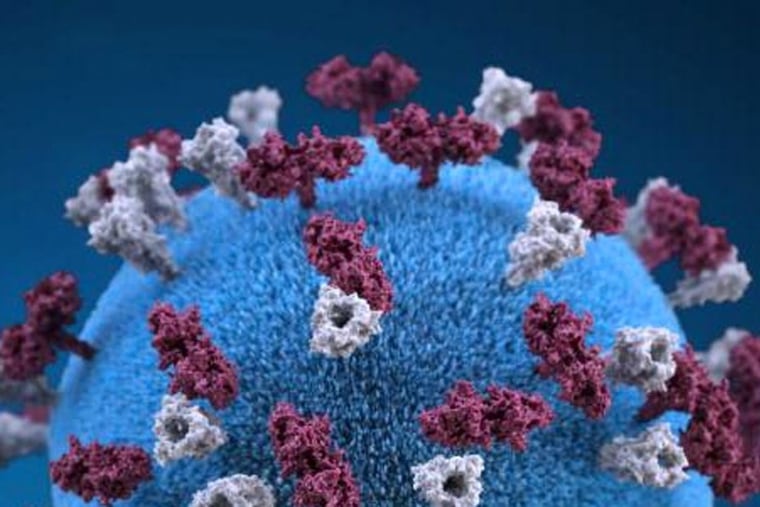New Jersey detects three measles cases, all in unvaccinated residents
The cases identified in New Jersey are separate from a serious measles outbreak that has swept through West Texas in the last month, with doctors diagnosing 124 cases in nine counties.

New Jersey health officials have identified three cases of measles in Bergen County, all in patients who were unvaccinated.
The first case was detected Feb. 14 in a county resident who had recently traveled internationally. The second and third cases were announced Feb. 21 in people who had interacted closely with the first patient.
The cases identified in New Jersey are separate from a serious measles outbreak that has swept through West Texas in the last month, with doctors diagnosing 124 cases in nine counties. One child has died — the first U.S. measles death in a decade. That outbreak is centered around a Mennonite community with lower rates of vaccination.
In 2024, the United States saw 285 measles cases, including an outbreak in Philadelphia that sickened nine people and hospitalized six of them. So far in 2025, the cases in Texas alone are approaching nearly half of last year’s total cases nationwide.
The outbreak in Texas follows ongoing debate in recent years over vaccines, with a growing anti-vaccination movement questioning wide-ranging immunizations that have been shown to be safe and effective. Many are closely watching the response from President Donald Trump’s newly appointed director of the Department of Health and Human Services, Robert F. Kennedy Jr., who has for decades promoted conspiracies about vaccines and questioned their efficacy.
At a White House cabinet meeting Wednesday, Kennedy called the outbreak in Texas typical, swiftly drawing criticism from health professionals who characterized the situation as “highly unusual” because of the wide spread of the virus there.
“The number of cases we have this year, in two months, is unprecedented for the last few decades,” said Perry Halkitis, the dean of Rutgers University’s School of Public Health.
Ninety-five percent of the cases reported in the United States this year were among people who had not been vaccinated for measles, mumps, and rubella, a vaccine recommended during early childhood, for which the first dose is 93% effective against measles and the second up to 97% of the time.
In New Jersey, health officials did not provide further details on how patients there were exposed to the virus. The second and third patients to be diagnosed with measles were under quarantine when diagnosed, officials said, making it more difficult for the virus to spread to anyone else.
» READ MORE: Philadelphia measles outbreak ends, after starting at CHOP and spreading through day care
Still, health officials said, it can take time before measles symptoms emerge in a patient. In New Jersey, health officials said that anyone who was at the Englewood Hospital emergency department in Englewood, N.J., between 11:30 a.m. and 5:30 p.m. on Feb. 9 should contact their doctors immediately to discuss their risk of contracting the virus.
While the department’s public statements mentioned only the potential of an exposure in Englewood, NorthJersey.com reported Wednesday that an additional alert had been sent to local health officials Feb. 14 identifying two other places that a measles patient had visited: PromptMD Urgent Care in Fort Lee, between 12:15 and 4 p.m. on Feb. 8, and Hackensack University Medical Center on Feb. 9 between 7 and 9 p.m.
Hackensack officials told NorthJersey.com that the patient, a child, had been taken immediately into an isolation room and that no other patients were exposed to the child or their family.
People who were exposed may not see symptoms for days to weeks.
Measles symptoms include a high fever; a cough; a runny nose; watery, red eyes; and a rash of flat, red spots that normally appears on the face three to five days after other symptoms begin and spreads across the body. In serious cases, measles causes pneumonia, swelling of the brain, and, in pregnant people, can lead to miscarriage, premature birth, and low birth weights.
Health officials said that all New Jersey residents should make sure they are up-to-date on all vaccinations, but especially measles, mumps, and rubella vaccinations. All residents planning to travel should also make sure they are up-to-date on vaccinations and speak to a pediatrician about the MMR vaccine if planning to travel with a baby between six and 11 months old.
Parents who have not vaccinated their children and are concerned about a potential measles exposure can get them vaccinated within 72 hours to provide some protection from the virus as well, Rutger’s Halkitis said.
The Centers for Disease Control and Prevention recommends that children get the MMR vaccine between 12 and 15 months old. Parents with younger children can talk to their pediatricians about whether they should consider getting the vaccine earlier, said Halkitis, who was not surprised by reports of the outbreak in Texas and other measles cases closer to home in unvaccinated patients.
“The idea of herd immunity, which we all talk about in public health, is not being realized with regard to measles. This has been a problem [years] in the making,” he said.
Editor’s note: This story was updated with additional information and comment.